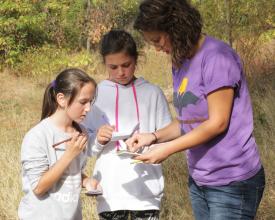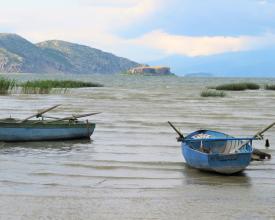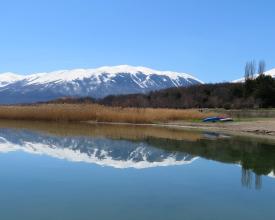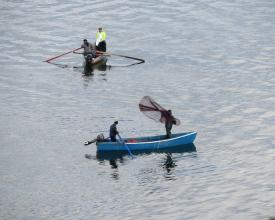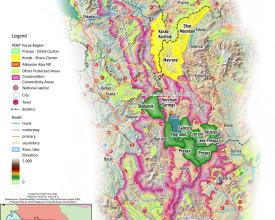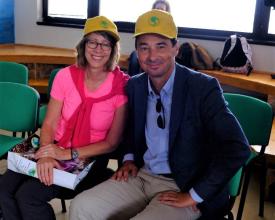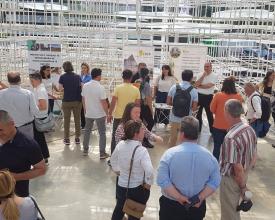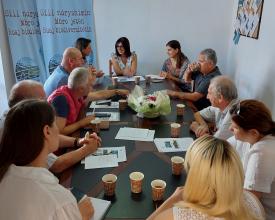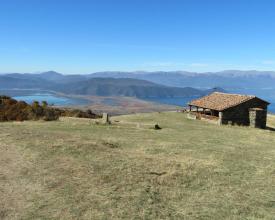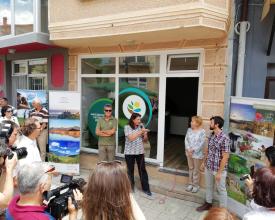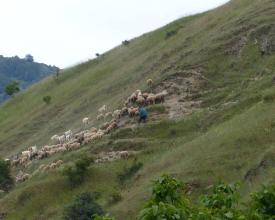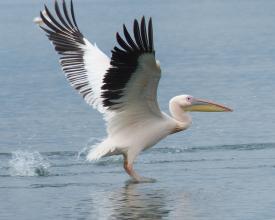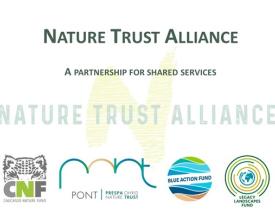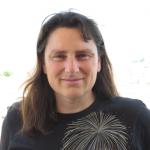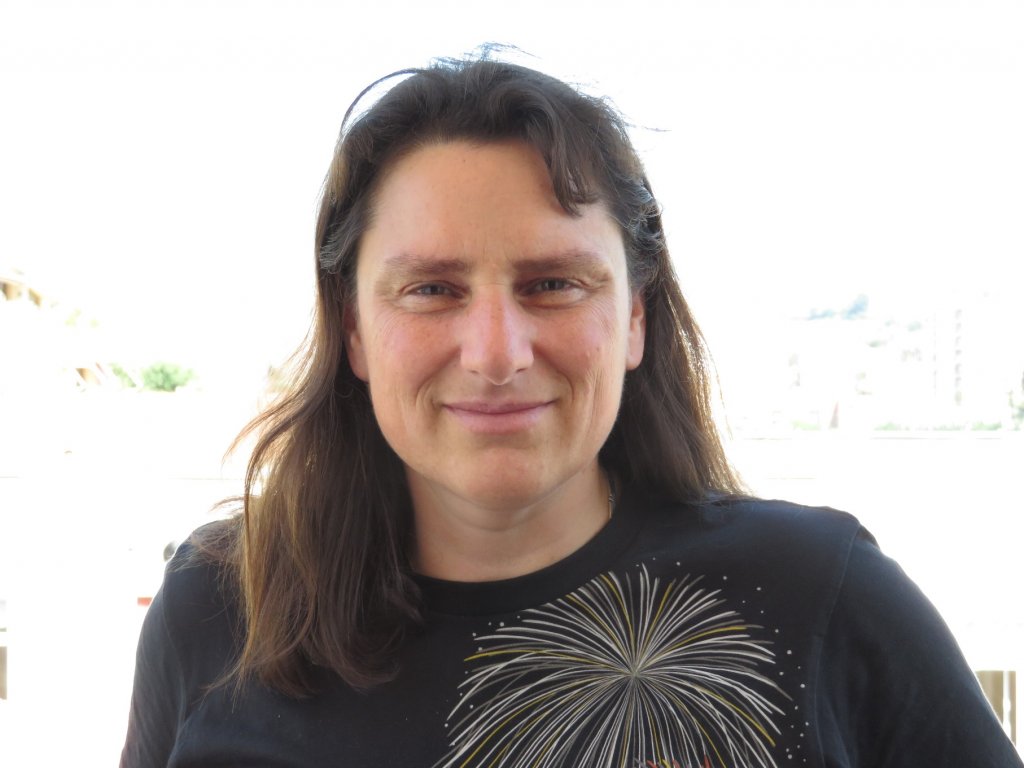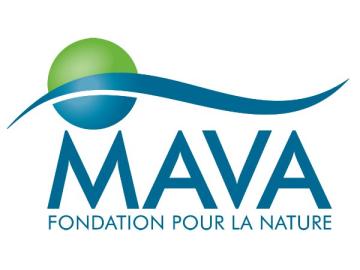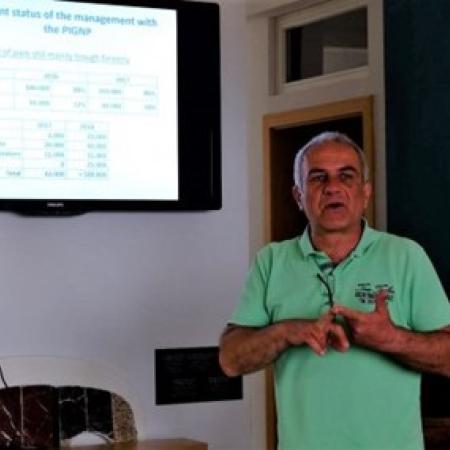
Prespa Ohrid Nature Trust (PONT) - un partenariat innovant qui renforce la conservation et la coopération
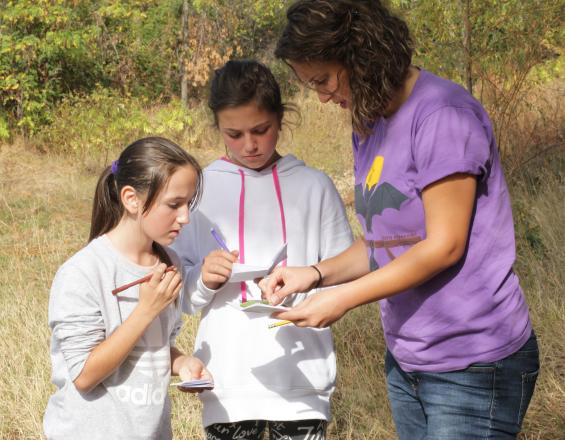
PONT est un fonds fiduciaire pour la conservation transfrontalière créé en 2015 avec un financement de MAVA et BMZ/KfW. Son objectif est de soutenir les besoins environnementaux croissants de la région de Prespa-Ohrid pour répondre au manque de financement des efforts de conservation. En 2025, la zone d'intervention du PONT est un point chaud de la biodiversité couvrant 1,9 million d'hectares en Albanie, en Grèce et en Macédoine du Nord, avec une marge d'expansion géographique supplémentaire. La région présente une diversité d'habitats exceptionnelle, abritant des populations viables d'espèces endémiques et rares. Les corridors de connectivité contribuent à consolider les éléments du paysage afin d'assurer le déplacement des espèces entre les zones protégées (ZP). Pour assurer une conservation durable et une gestion efficace des zones protégées, la coopération à l'intérieur et à l'extérieur des frontières est cruciale. Le PONT a obtenu un financement à long terme (~3 millions d'euros par an jusqu'en 2040), qui est également utilisé pour obtenir un cofinancement des activités. Les subventions soutiennent les objectifs de conservation et le développement des capacités. Les services partagés réduisent les coûts administratifs.
Contexte
Défis à relever
L'environnement : La conservation n'est pas une priorité pour les trois gouvernements nationaux. Les organes de gestion des aires protégées sont faibles en termes d'expertise et de financement de la conservation. La coopération transfrontalière fonctionne de manière informelle. Les défis les plus importants en matière de conservation des lacs de Prespa sont liés à la qualité de l'eau et à l'eutrophisation. Le changement climatique devrait entraîner une diminution des conditions climatiques appropriées, un ralentissement de la migration naturelle des espèces et la dégradation de nombreux habitats naturels.
Socio-économique : taux d'émigration élevé et perte de capital social qui en découle. La région est habitée par un mélange ethnique diversifié de personnes avec des taux de chômage élevés, des conditions économiques locales médiocres avec des difficultés dans le commerce des produits locaux, et un manque d'infrastructures de base. La société civile est faible en Albanie et en Macédoine du Nord, mais plus forte en Grèce. Il s'agit d'une zone rurale dominée par l'agriculture et quelques revenus provenant de l'élevage, de la pêche, de la sylviculture et du tourisme.
Emplacement
Traiter
Résumé du processus
Le fonds fiduciaire pour la conservation transfrontalière appelé PONT a été créé dans le cadre d'un partenariat entre la Fondation MAVA et la KfW (au nom du gouvernement allemand). Il a permis de soutenir financièrement des ONG de conservation et des organismes de gestion de zones protégées (ZP) dans la zone d'intervention du PONT. Le financement durable est axé sur les leçons apprises et les lacunes identifiées dans la gestion de la conservation. PONT travaille en coopération avec les principales ONG locales, les organismes de gestion des aires protégées et d'autres parties prenantes dans la région. Grâce au soutien à long terme et au financement de base des organes des aires protégées et du réseau d'ONG de la région, des fonds supplémentaires ont été obtenus pour les projets et les activités prévus, y compris la conservation de la connectivité. Cela a permis de maintenir les opérations quotidiennes et les activités clés du programme, tout en permettant la mise en œuvre d'importants projets de conservation au profit des populations et de la nature. La mise en commun des services administratifs entre quatre fonds, par l'intermédiaire du bureau de services partagés Nature Trust Alliance, a entraîné une réduction des coûts qui permet d'allouer plus d'argent au programme de subventions PONT et aux objectifs de conservation.
Blocs de construction
Partenariat entre la Fondation MAVA et la KfW
Un partenariat solide entre la Fondation MAVA et la KfW (au nom du gouvernement allemand) a permis la création de PONT en 2015. Les deux partenaires ont investi des fonds considérables dans la région de Prespa par le passé dans différents projets et pour soutenir leurs efforts à perpétuité, ils ont uni leurs forces pour mobiliser suffisamment d'argent pour donner à PONT un excellent départ. La dotation et les fonds d'amortissement permettent à PONT de cofinancer le travail des zones protégées et des ONG jusqu'en 2040 au moins.
Facteurs favorables
Volonté de deux donateurs importants de financer à long terme un hotspot de biodiversité
Chaque donateur a ses limites géographiques, mais ils unissent leurs forces pour conserver l'ensemble de l'écorégion.
Dépendance réciproque par le biais du cofinancement. Le financement initial de la Fondation MAVA a permis à la KfW de faire pression pour obtenir un financement du gouvernement allemand.
Création de synergies grâce à l'expérience acquise en matière de soutien aux ONG et au secteur public.
Soutien d'autres acteurs tels que le WWF Grèce, la Société zoologique de Francfort, le Fonds pour la nature du Caucase, EuroNatur et le CEPF.
Leçon apprise
Deux donateurs importants ont investi dans une zone géographique spécifique, un point chaud de la biodiversité, dans le cadre de différents projets. Les deux donateurs ont compris que pour conserver cette zone, il est important de garantir un financement à long terme à l'intérieur et au-delà des frontières de l'État, à la fois pour les organismes de gestion des zones protégées et pour la société civile. Ils ont compris que les déficits de financement concernaient principalement les coûts de fonctionnement et d'exploitation. Les deux parties ont uni leurs forces en créant un fonds fiduciaire transfrontalier pour la conservation, car elles n'étaient pas en mesure d'assurer à elles seules le financement de l'ensemble du paysage. Elles y sont parvenues avec l'aide de partenaires solides disposant d'une connaissance approfondie de la région du PONT, à savoir le WWF Grèce et la Société zoologique de Francfort. Le WWF Grèce a réalisé l'étude de faisabilité pour le compte de la Fondation MAVA et de la KfW, avec l'aide du Fonds de partenariat pour les écosystèmes critiques (CEPF). Le Caucasus Nature Fund et la Frankfurt Zoological Society ont également apporté des contributions importantes.
La stratégie du PONT encourage la coopération transfrontalière entre les partenaires gouvernementaux et non gouvernementaux
La stratégie du PONT a été élaborée en s'appuyant sur l'expérience des partenaires du PONT qui travaillent dans la région depuis longtemps. En travaillant directement avec ces ONG et les organismes de gestion des zones protégées, les principaux objectifs de conservation et de développement des capacités ont été déterminés. Il en est résulté une stratégie axée sur le financement des lacunes et la création de partenariats solides avec les parties prenantes qui ont un mandat, une vision et l'expertise nécessaire pour obtenir des résultats en matière de conservation dans la zone d'intervention du PONT. La stratégie du PONT encourage la coopération transfrontalière entre les partenaires gouvernementaux et non gouvernementaux sur la base des expériences précédentes.
Facteurs favorables
Une étude complète rassemblant les enseignements tirés de ce qui a été fait au cours des 25 dernières années et les lacunes qui subsistent.
Utilisation des organes de gestion des aires protégées et des ONG pour travailler sur la stratégie du PONT à un niveau transfrontalier pour l'ensemble de la zone d'intervention du PONT.
Financement disponible pour les partenaires gouvernementaux et non gouvernementaux
Leçon apprise
Au lieu de réinventer la roue, les expériences précédentes ont été rassemblées par les partenaires de PONT qui travaillent dans la zone géographique depuis longtemps. Ce travail a été réalisé sous la coordination du WWF Grèce qui connaît très bien la région et a pu vérifier les résultats. Les recommandations relatives aux objectifs de conservation ont été vérifiées par les organismes des zones protégées et ont servi de base aux objectifs de conservation de la stratégie du PONT. Avec l'aide de l'expertise du PONT, d'autres objectifs tels que le développement organisationnel et le développement des capacités ont été identifiés et ajoutés. Au fil des ans et de plusieurs cycles d'octroi de subventions, cette démarche a abouti à une stratégie participative actualisée pour la zone d'intervention élargie du PONT, qui a été acceptée par les parties prenantes gouvernementales et non gouvernementales à l'intérieur et à l'extérieur des frontières de l'État. Afin de concentrer le financement sur les lacunes identifiées, les bénéficiaires potentiels sont identifiés sur la base de leur mandat, de leur vision, de leur expérience et de leur expertise dans le domaine concerné. Les AP éligibles qui sont "prêtes pour le PONT" sont directement invitées à demander des subventions, tandis que la plupart des ONG entrent dans le partenariat par le biais d'appels à propositions ouverts.
Ressources
Financement dans l'ensemble de l'écorégion permettant une gestion écosystémique des habitats et de la faune à l'échelle du paysage
PONT est actif dans les secteurs suivants :
- Conservation et amélioration de la biodiversité - nous accordons des subventions opérationnelles à long terme aux zones protégées afin d'améliorer l'efficacité de la gestion conformément aux normes européennes et internationales. Nous accordons des subventions aux acteurs environnementaux (principalement des ONG et quelques instituts de recherche) pour soutenir d'importantes actions de conservation dans les zones protégées et dans le paysage plus large afin d'améliorer la conservation de la connectivité dans les écosystèmes aquatiques et terrestres. Pour ces derniers, nous avons déterminé les zones importantes de conservation de la connectivité.
- Gestion durable des ressources naturelles - les populations locales jouent un rôle clé dans le paysage et nous soutenons donc des activités liées à la gestion durable des ressources naturelles (tourisme axé sur la nature, culture de plantes aromatiques médicinales et d'autres produits forestiers non ligneux, soutien à divers groupes de femmes, bergers, participation locale, science citoyenne, soutien aux travailleurs saisonniers pour aider à la gestion des incendies, entretien des sentiers de randonnée, etc.) Depuis 2022, PONT a adopté et met en œuvre un système de gestion environnementale et sociale.
Facteurs favorables
Un donateur prêt à payer les salaires du personnel et les frais généraux
Un financement sûr à long terme
Développement organisationnel à long terme et présence au niveau local
Leçon apprise
PONT a réussi à augmenter sa base de financement de 300%. Il est ainsi passé d'une subvention en 2016 à 40 subventions en 2023 (10 AP et 30 EA). PONT débourse environ 3 à 4 millions d'euros par an pour deux programmes de subventions soutenus par divers donateurs (BMZ/KfW ; Fondation MAVA ; Fondation Hans Wilsdorf ; Sigrid Rausing Trust ; et le Fonds français pour l'environnement mondial). "La valeur ajoutée de PONT dans le domaine d'intervention. PONT a la capacité de travailler directement sur la coopération transfrontalière plutôt que par le biais d'accords bilatéraux, ce qui est souvent le cas pour les donateurs multilatéraux ou bilatéraux. Le PONT est considéré comme un acteur neutre dans la région. N'ayant pas d'"agenda" et étant reconnu pour sa capacité d'écoute et de résolution des problèmes, le PONT a été en mesure de contribuer à des avancées dans des domaines politiques sensibles. PONT dispose de la flexibilité nécessaire pour fournir un soutien opérationnel complémentaire aux investissements réalisés grâce aux fonds des donateurs. Il est l'une des rares institutions à pouvoir accorder des subventions pour couvrir les frais de fonctionnement. PONT est intervenu pour financer juste à temps des études qui auraient été retardées par les processus complexes de passation de marchés des donateurs". K. Mikitin, évaluateur externe, 2023
Nature Trust Alliance : un partenariat pour des services partagés afin de réduire les coûts administratifs
PONT fait partie d'une coopération entre quatre fonds appelée Nature Trust Alliance (NTA), pour partager des services opérationnels. La NTA a été établie entre le Caucasus Nature Fund (CNF) et PONT en juin 2016. En mars 2017, le Blue Action Fund a rejoint le partenariat de travail, suivi par le Legacy Landscapes Fund en 2020. La mission de NTA est de "fournir un soutien opérationnel à nos partenaires pour leur permettre de se concentrer sur leurs missions principales en matière de conservation de la nature". Le bureau de la NTA se trouve à Francfort, car les quatre fonds partenaires de la NTA sont des fondations enregistrées en Allemagne. Le NTA a permis à PONT d'établir son bureau de programme régional à Tirana, en Albanie, à partir duquel le programme de subventions est géré. Grâce à ce partenariat de services partagés, PONT économise des coûts administratifs (paiements, comptabilité, rapports, audits, soutien à l'investissement, communication).
Facteurs favorables
Renforcement de la position de négociation avec les prestataires de services externes (banques, auditeurs, etc.)
Economies d'échelle grâce à la mise en commun de certains services
Gains d'efficacité dans l'élaboration et la mise en œuvre de nouvelles procédures, de nouveaux systèmes et de la conformité à la législation (1 fois pour l'élaboration/4 fois pour l'utilisation)
Comité d'investissement et politiques d'investissement partagés
Leçon apprise
Il est important d'analyser, de définir et d'approuver les services partagés potentiels. S'il n'y a pas d'économies d'échelle attendues, il n'est pas conseillé d'en faire un service partagé, car le niveau de complexité augmente dans une structure de services partagés. Les services de type identique s'intègrent mieux dans un concept de services partagés. Dans le cas du NTA, cela signifie que les services administratifs et les services liés à l'investissement en Allemagne sont des services partagés. Les programmes de subvention et les services administratifs spécifiques aux sites étant différents pour les quatre fonds, ils ne sont pas inclus dans les services partagés.
Les attentes, les procédures et la structure de gestion et de gouvernance doivent être discutées et approuvées dès le départ. Des outils de communication et de prise de décision clairs et faciles à utiliser doivent être mis en place. Le partage régulier des connaissances permet une amélioration continue grâce à l'apprentissage mutuel. Un bureau de services partagés existant peut être très bénéfique pour les nouveaux fonds dans leur phase de démarrage, leur permettant de démarrer rapidement. Toutefois, l'entrée d'un nouveau fonds partenaire doit être soigneusement étudiée et il doit y avoir suffisamment d'éléments communs pour que cela soit bénéfique.
Impacts
Grâce à un partenariat entre MAVA et KfW (au nom du BMZ), et avec le soutien d'autres donateurs, PONT fournit un financement durable à 40 partenaires (10 AP et 30 acteurs environnementaux, principalement des ONG) jusqu'en 2040. En 2024, un territoire de 351 234 ha d'aires protégées est soutenu. Le PONT finance 36 partenariats stratégiques entre les AP et les AE et soutient au total 90 entreprises vertes. Les premières interventions visant à améliorer la conservation de la connectivité ont commencé.
Le financement de base fourni par le fonds fiduciaire pour la conservation transfrontalière permet aux partenaires du PONT d'obtenir des fonds supplémentaires pour les projets prévus. Le financement permet aux ONG partenaires de gérer des bureaux locaux et de travailler sur leurs programmes en étroite collaboration avec les organes de gestion des aires protégées sur une longue période. En 2024, le ratio des coûts administratifs du PONT lui-même était de 6 %.
Le PONT a contribué à des avancées dans des domaines politiques sensibles tels que le retrait de l'exploitation forestière dans les aires protégées, en particulier dans le PN Galicica, et a encouragé le dialogue collaboratif et les actions visant à réduire les tensions régionales. Dans le nouveau PN des Alpes albanaises et le PN du Mont Shar, une contribution essentielle a permis d'assurer une mise en place rapide et efficace de la structure administrative, le lancement des opérations et la mise en œuvre effective du plan de gestion de l'AP.
Bénéficiaires
Les bénéficiaires directs sont les organismes de gestion des zones protégées, les ONG et les instituts de recherche opérant dans les trois pays. Les bénéficiaires indirects sont les personnes vivant dans la zone d'intervention du PONT.
Cadre mondial pour la biodiversité (CMB)
Objectifs de développement durable
Histoire

Andon Bojadzi, du parc national de Galicica, illustre l'importance d'une large participation à la planification de la gestion des zones protégées. Lors de l'élaboration du plan de gestion du parc national de Galicica, un conseil représentatif des parties prenantes a été créé et consulté sur la préparation d'un plan de gestion. Tous les villages situés à l'intérieur et à la périphérie du parc national de Galicica ont été impliqués dans le processus de zonage et ont compris son contenu. Par la suite, le gouvernement de Macédoine du Nord a tenté de modifier le plan de gestion du parc national de Galicica pour créer une station de ski et une route d'accès. Ces développements ont menacé le statut de patrimoine mondial de la région du lac Ohrid, dont le parc national de Galicica fait partie. L'autorité du parc national de Galicica n'a pas été en mesure d'arrêter ces plans, mais avec l'aide de la société civile et des communautés, ils ont été stoppés.
Le précédent plan de gestion du parc national de Galiccia était soutenu par la KfW. Aujourd'hui, la KfW a contribué à la création de PONT et le financement de PONT a été utilisé pour mettre à jour et établir le nouveau plan de gestion du parc national de Galicica et sa mise en œuvre.
Cela inclut le financement de la consultation des communautés. C'est la première chose qu'a faite Andon Bojadzi lors de la mise à jour du plan de gestion. Grâce à l'aide des communautés locales et des partenariats locaux, il se sent beaucoup plus fort pour réaliser ses ambitions et ses objectifs. PONT l'aide à travailler sur ces partenariats à long terme.
Une autre ambition d'Andon Bojadzi, celle de rendre le parc national de Galicica indépendant de l'exploitation du bois pour le paiement des salaires du personnel, a été réalisée en 2020. Bien que le gouvernement ne fournisse aucun financement pour la gestion du parc national de Galicica, Andon Bojadzi a réussi à devenir indépendant de l'exploitation forestière chaque année pour payer les coûts de gestion. Les droits d'entrée et les activités touristiques, ainsi que le soutien durable à long terme de PONT, sont actuellement suffisants pour gérer le parc national en partenariat avec la communauté locale.

